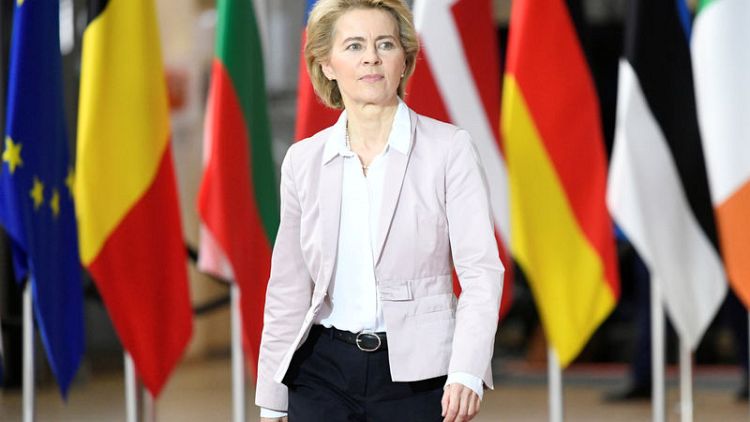By Gabriela Baczynska and Sabine Siebold
STRASBOURG/BERLIN (Reuters) - The European Union's new boss has pledged major policy changes to address some of the bloc's biggest problems, from migration to climate change, but will need to navigate deep divisions among member countries.
German conservative Ursula von der Leyen, a close ally of German Chancellor Angela Merkel, will be the first woman to assume the EU's top job when she takes over as European Commission president on Dec. 1. She has vowed to take a pragmatic approach in order to build consensus to pursue policy priorities such as tackling migration, an issue that has sowed bitter divides among the EU’s 28 member states.
On Wednesday, von der Leyen said she planned to increase efforts to fight the threat of climate change while expanding economic growth as EU lawmakers gave final approval for her to take over the helm of the bloc's powerful executive in Brussels.
Speaking to Reuters last month, von der Leyen said she will travel extensively to speak to EU leaders in an attempt to bridge divisions. One of her first trips following her July nomination was to Poland, where the ruling eurosceptic government has repeatedly clashed with the EU's political hub Brussels, including over migration and climate.
"Everyone understands we may have different interests, we may want to go different in different directions, but it helps to understand that we have to tackle a problem together," von der Leyen told Reuters.
The daughter of a prominent German politician who also served as senior EU official, von der Leyen spent much of her childhood in Brussels. After an early career in medicine, she served as a long-time minister in Merkel's centre-right Christian Democrats (CDU).
Her six years at the German defence ministry were marred by criticism from politicians, including from within her own party, over a troubled overhaul of Germany's aging military equipment and defence procurement system. Von der Leyen acknowledges that some of her efforts - including on family and gender policies - were initially unpopular within her party but says that she owes a lot to the CDU.
Von der Leyen, 61 years old, assumes her new job at a time of heightened euroscepticism that has already prompted Britain, one of the EU's largest financial contributors, to seek departure from the bloc.
As Commission president, von der Leyen will be responsible for leading negotiations with Britain on future trade arrangements if it leaves the EU, as well as navigating the bloc's trade disputes with U.S. President Donald Trump. The Commission also acts as the EU's competition watchdog and von der Leyen has signalled she would seek a further toughening of rules for tech giants like Facebook and Google.
In approaching her new job, von der Leyen has set out an ambitious agenda aimed at tackling migration, combating climate change and promoting gender equality among other policy priorities.
Nearly half of her Commission team, where each member state normally has one representative, are women. She has also vowed to achieve gender equality at the end of her five-year mandate in all management jobs at the Commission.
She has pledged to make Europe the first climate-neutral continent by 2050 and to toughen the target for cutting greenhouse gas emissions by 2030. In order to appeal to the more carbon-intensive economies in the EU, most in the east, she has pledged extra funds to support projects that would contribute to lower emissions while not stifling the economies.
Another divisive issue that will dominate von der Leyen's first year in office are talks over the EU's next long-term budget. She wants a higher baseline budget figure in order to pay for increased spending on international efforts, climate and digital initiatives, among other areas. But some EU countries, including her native Germany, strongly oppose paying more.
"She is competent and conciliatory, she has a European vision. That's the best we can hope for and we should support her rather than expect that she single-handedly solves all EU problems," said Poland's former foreign minister and now a conservative EU lawmaker, Radoslaw Sikorski.
(GRAPHIC: The new EU leadership: https://graphics.reuters.com/EU-JOBS/010092MD3E2/index.html)
(Writing by Gabriela Baczynska; Editing by Cassell Bryan-Low)
